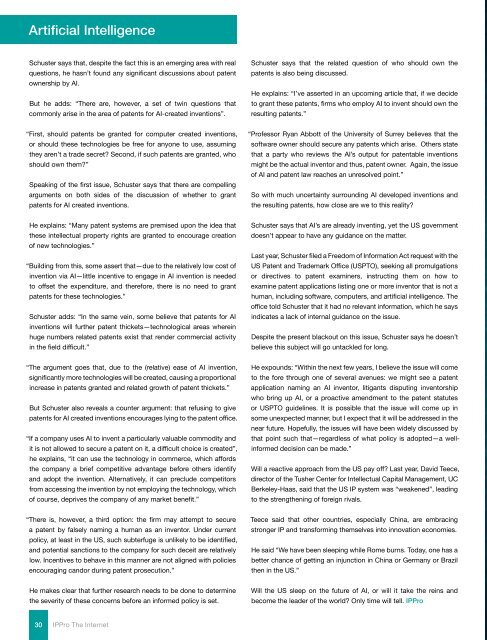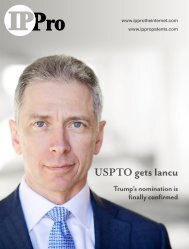IPPro Issue 002
IPPro is the go-to industry publication for news, views, and opinion on patent practice, law and management. The fortnightly publication and accompanying website - the only free-to-read intellectual property resource around - cover the full spectrum of IP law globally, including prosecution, litigation, licensing, management and technology.
IPPro is the go-to industry publication for news, views, and opinion on patent practice, law and management. The fortnightly publication and accompanying website - the only free-to-read intellectual property resource around - cover the full spectrum of IP law globally, including prosecution, litigation, licensing, management and technology.
You also want an ePaper? Increase the reach of your titles
YUMPU automatically turns print PDFs into web optimized ePapers that Google loves.
Artificial Intelligence<br />
Schuster says that, despite the fact this is an emerging area with real<br />
questions, he hasn’t found any significant discussions about patent<br />
ownership by AI.<br />
But he adds: “There are, however, a set of twin questions that<br />
commonly arise in the area of patents for AI-created inventions”.<br />
Schuster says that the related question of who should own the<br />
patents is also being discussed.<br />
He explains: “I’ve asserted in an upcoming article that, if we decide<br />
to grant these patents, firms who employ AI to invent should own the<br />
resulting patents.”<br />
“First, should patents be granted for computer created inventions,<br />
or should these technologies be free for anyone to use, assuming<br />
they aren’t a trade secret? Second, if such patents are granted, who<br />
should own them?”<br />
Speaking of the first issue, Schuster says that there are compelling<br />
arguments on both sides of the discussion of whether to grant<br />
patents for AI created inventions.<br />
“Professor Ryan Abbott of the University of Surrey believes that the<br />
software owner should secure any patents which arise. Others state<br />
that a party who reviews the AI’s output for patentable inventions<br />
might be the actual inventor and thus, patent owner. Again, the issue<br />
of AI and patent law reaches an unresolved point.”<br />
So with much uncertainty surrounding AI developed inventions and<br />
the resulting patents, how close are we to this reality?<br />
He explains: “Many patent systems are premised upon the idea that<br />
these intellectual property rights are granted to encourage creation<br />
of new technologies.”<br />
“Building from this, some assert that—due to the relatively low cost of<br />
invention via AI—little incentive to engage in AI invention is needed<br />
to offset the expenditure, and therefore, there is no need to grant<br />
patents for these technologies.”<br />
Schuster adds: “In the same vein, some believe that patents for AI<br />
inventions will further patent thickets—technological areas wherein<br />
huge numbers related patents exist that render commercial activity<br />
in the field difficult.”<br />
Schuster says that AI’s are already inventing, yet the US government<br />
doesn’t appear to have any guidance on the matter.<br />
Last year, Schuster filed a Freedom of Information Act request with the<br />
US Patent and Trademark Office (USPTO), seeking all promulgations<br />
or directives to patent examiners, instructing them on how to<br />
examine patent applications listing one or more inventor that is not a<br />
human, including software, computers, and artificial intelligence. The<br />
office told Schuster that it had no relevant information, which he says<br />
indicates a lack of internal guidance on the issue.<br />
Despite the present blackout on this issue, Schuster says he doesn’t<br />
believe this subject will go untackled for long.<br />
“The argument goes that, due to the (relative) ease of AI invention,<br />
significantly more technologies will be created, causing a proportional<br />
increase in patents granted and related growth of patent thickets.”<br />
But Schuster also reveals a counter argument: that refusing to give<br />
patents for AI created inventions encourages lying to the patent office.<br />
“If a company uses AI to invent a particularly valuable commodity and<br />
it is not allowed to secure a patent on it, a difficult choice is created”,<br />
he explains, “it can use the technology in commerce, which affords<br />
the company a brief competitive advantage before others identify<br />
and adopt the invention. Alternatively, it can preclude competitors<br />
from accessing the invention by not employing the technology, which<br />
of course, deprives the company of any market benefit.”<br />
He expounds: “Within the next few years, I believe the issue will come<br />
to the fore through one of several avenues: we might see a patent<br />
application naming an AI inventor, litigants disputing inventorship<br />
who bring up AI, or a proactive amendment to the patent statutes<br />
or USPTO guidelines. It is possible that the issue will come up in<br />
some unexpected manner, but I expect that it will be addressed in the<br />
near future. Hopefully, the issues will have been widely discussed by<br />
that point such that—regardless of what policy is adopted—a wellinformed<br />
decision can be made.”<br />
Will a reactive approach from the US pay off? Last year, David Teece,<br />
director of the Tusher Center for Intellectual Capital Management, UC<br />
Berkeley-Haas, said that the US IP system was “weakened”, leading<br />
to the strengthening of foreign rivals.<br />
“There is, however, a third option: the firm may attempt to secure<br />
a patent by falsely naming a human as an inventor. Under current<br />
policy, at least in the US, such subterfuge is unlikely to be identified,<br />
and potential sanctions to the company for such deceit are relatively<br />
low. Incentives to behave in this manner are not aligned with policies<br />
encouraging candor during patent prosecution.”<br />
Teece said that other countries, especially China, are embracing<br />
stronger IP and transforming themselves into innovation economies.<br />
He said “We have been sleeping while Rome burns. Today, one has a<br />
better chance of getting an injunction in China or Germany or Brazil<br />
then in the US.”<br />
He makes clear that further research needs to be done to determine<br />
the severity of these concerns before an informed policy is set.<br />
Will the US sleep on the future of AI, or will it take the reins and<br />
become the leader of the world? Only time will tell. <strong>IPPro</strong><br />
30 <strong>IPPro</strong> The Internet





